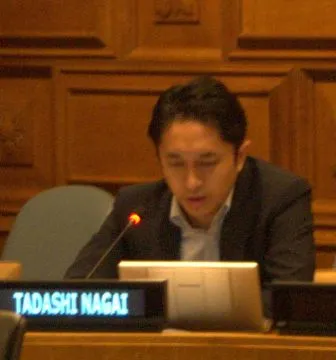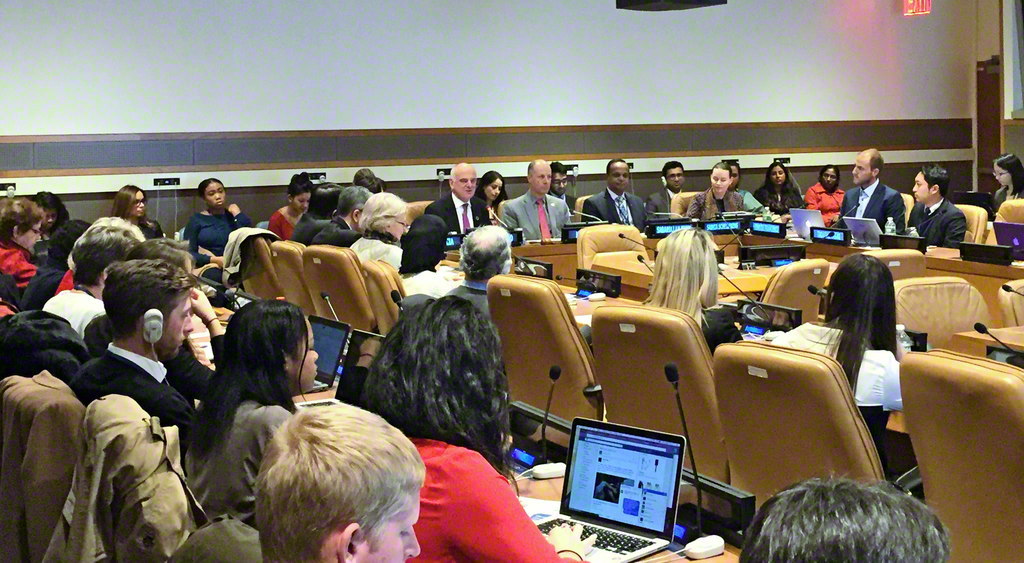By Rodney Reynolds
UNITED NATIONS (IDN) – Secretary-General Ban Ki-moon, who has continued to reiterate the key role to be played by youth in the implementation of the UN’s 17 Sustainable Development Goals (SDGs) by 2030, points out that many young people across the world have been disproportionately affected by economic crises and recession.
“As torch bearers of the new development agenda, you have a critical role to play in ending poverty, inequality, hunger and environmental degradation. Your actions will be central in ushering in an era in which no one is left behind,” he told a gathering of youth. | HINDI | JAPANESE | PORTUGUESE | SPANISH | SWAHILI | TAGALOG | TURKISH
And globally, over 73 million youth are unemployed, according to recent UN statistics.
Still, the world now has more young people than ever before in human history: nearly 46 per cent of the world’s population is under 25. Africa and the Middle East have the highest proportion of young people – around 60 per cent of the population, says Deputy Secretary-General Jan Eliasson.
“This presents a unique opportunity for developing innovative solutions for peace and development,” according to Elisasson.
Against this backdrop, Soka Gakkai International (SGI) and Earth Charter International (ECI) sponsored a timely UN panel discussion on ”Youth Boosting and Implementation of SDGs,” which was attended by nearly 100 representatives of civil society organizations (CSOs), youth delegates, diplomats and senior UN officials.
Hosted by the Sri Lanka Mission to the United Nations, the discussion took place at the UN Secretariat on November 10.
The panel consisted of Dr. David Nabarro, UN Secretary-General’s Special Adviser on the 2030 Agenda; Ambassador Sabarullah Khan, Deputy Permanent Representative of Sri Lanka to the United Nations; Saskia Schellekens, Special Adviser to the UN Secretary-General’s Envoy on Youth and Sofia Garcia of SOS Children’s Villages.
The discussion was moderated by Maher Nasser, Director, Outreach Division of the UN’s Department of Public Information (DPI).
In his opening remarks, Dr. Nabarro stressed the universality of the 2030 Agenda, and emphasized that young people must be part of sustainable development. He singled out the significance of youth as carriers of the message of the SDGs to the world, and the instrumentality of the new technology in that process.
Reiterating the priority given to youth by his government, Ambassador Sabarullah Khan said as Sri Lanka is poised to implement the 2030 Agenda at the national level, it has kept women, youth, children and persons with disabilities at the centre of its national plans, in keeping with the Agenda’s key vision ‘leaving no one behind’.
He said youth has a unique role to play in realizing the SDGs and that the Government of Sri Lanka is well aware of this role. He added that the foremost role that youth can play in supporting the achievement of SDGs would be to bring its message to a larger global audience.
Ambassador Khan observed that Sri Lanka had seen the positive effect of mobilizing youth in this awareness campaign.
He said that though there are several obstacles that affect the full involvement of youth in realizing the SDGs, those obstacles could be overcome by empowering youth through education, skills development and focus on innovation.
He pointed out that Sri Lanka has developed inclusive strategies on promoting education and skills training for youth. He further stated that having realized the importance of skills development for youth, Sri Lanka was instrumental in declaring July 15 as the World Youth Skills Day.
Special Adviser to the UN Secretary-General’s Envoy on Youth Saskia Schellekens thanked Sri Lanka for the prominent role it plays at the United Nations in advancing youth issues. She also stressed the importance of raising awareness of the SDGs and mobilizing youth for that purpose. She added that it is imperative to strengthen the Ministries of Youth as a means of empowering youth.
Sofia Garcia of SOS Children’s Villages spoke on the importance of including young people in the decision-making structures in respect of the SDGs.
The quality of childhood sets the stage for our future development – both as individuals and societies, says SOS Children’s Villages International, based in Vienna.
The organization says that “all children count, but not all children are counted”. It advocates the inclusion of children in the national and international monitoring systems for SDGs. “Yet unacceptable data gaps remain for the inclusion of these children,” it warns
A concept paper prepared by SGI and ECI, released ahead of the panel discussion, said implementing and achieving the SDGs require active participation of civil society, in particular the younger generations.
Global challenges addressed by the goals not only seriously impact the youth today, but also will affect their future. In addition, young people are fluent in technological and social media tools, which could be utilized to promote the SDGs and encourage initiatives that support them.
The important role of youth in achieving SDGs are underscored in Transforming our World: the 2030 Agenda for Sustainable Development, which declares: “What we are announcing today – an Agenda for global action for the next 15 years – is a charter for people and planet in the twenty-first century.“
“Children and young women and men are critical agents of change and will find in the new Goals a platform to channel their infinite capacities for activism into the creation of a better world.”
The event also saw the launching of the new mobile app ‘Mapting’: an interactive app developed by two youth representatives from SGI and ECI, which aims at educating and engaging youth on SDGs.

Launching the new App, Tadashi Nagai, Program Officer for Sustainable Development and Humanitarian Affairs at SGI and co-project manager of Mapting, told the meeting: “We are delighted to have this opportunity to launch our App named Mapting here at United Nations.”
He said the project was started in January to coincide with the start of the implementation of SDGs, but took 10 months to develop it.
Meanwhile, other Apps for promoting SDGs such as “SDGs in Action” produced by UN have emerged, but “we hope that Mapting can complement them in terms of raising awareness among ordinary people, especially youth, at the grassroots level”.
A visual presentation was made, along with the participation of ECI’s Dino De Francesco, co-project manager of Mapting. [IDN-InDepthNews – 13 November 2016]
Related articles:
Marketable Youth Skills – Today’s Challenge
Youth Skills Development – Today’s Critical Global Challenge
Photo: An overview of the SGI-EIC event at the UN. Credit: Tsuneo Yabusaki.




